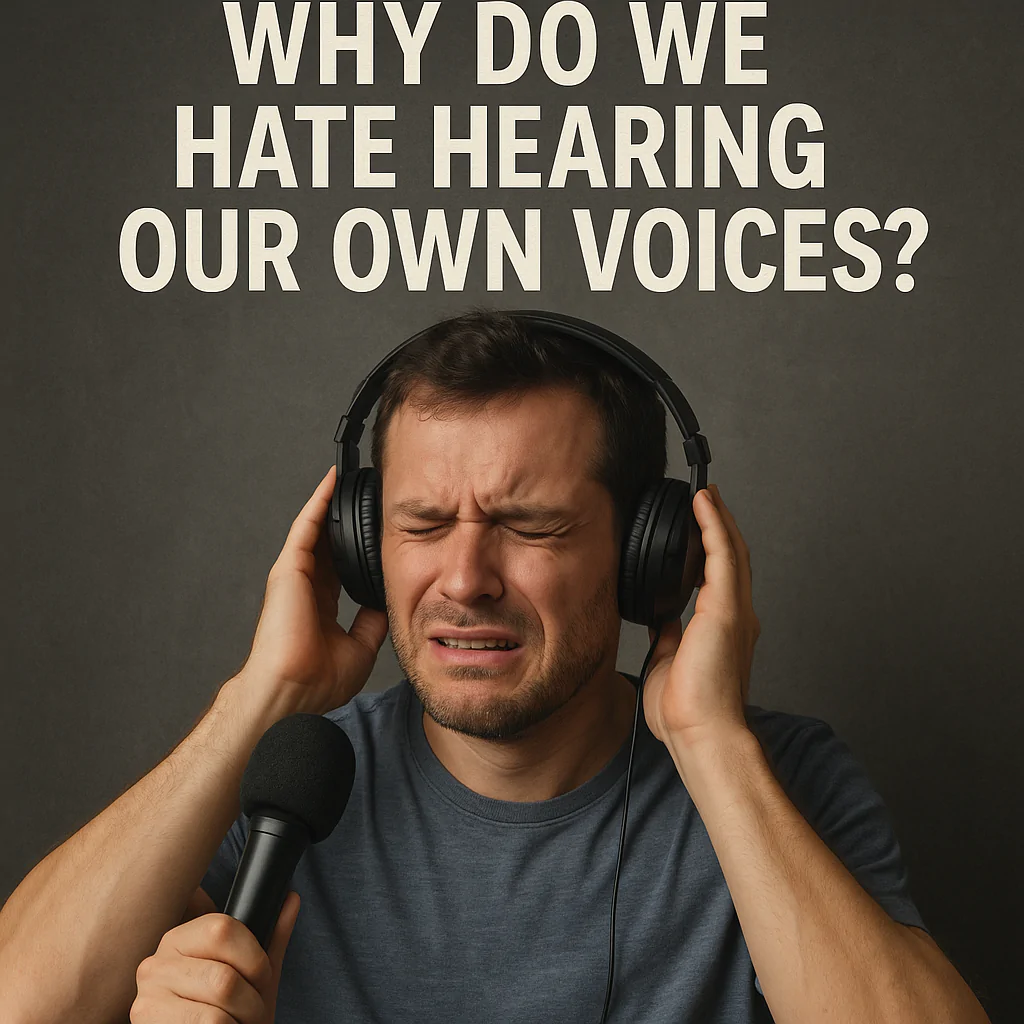Why Do We Hate Hearing Our Own Voices?

Ever cringe when you hear your voice played back on a recording? You’re not alone. That weird, unfamiliar sound coming out of the speakers makes most of us want to cover our ears and run for the hills. But why do we hate hearing ourselves so much? What is it about our own voices that sends shivers down our spines? Turns out, there’s some fascinating science behind why your voice sounds so different in your head versus on tape. Let’s dive into the reasons we all become our own worst critics when it comes to how we sound out loud.
The Science Behind Hating Your Own Voice
Have you ever wondered why your recorded voice sounds so different from what you hear in your head? Let’s dive into the fascinating science behind this common phenomenon.
The Bone Conduction Effect: When you speak, you’re not just hearing your voice through your ears. Your skull actually conducts sound waves directly to your inner ear, creating a richer, deeper tone. This is called bone conduction. It’s why your voice sounds fuller and more resonant to you than it does on a recording.
Recordings capture only the air-conducted sound of your voice, missing those low frequencies transmitted through your bones. This can make your recorded voice sound higher and thinner than you’re used to hearing. It’s not that the recording is inaccurate – it’s actually closer to how others hear you!
The Familiarity Factor: There’s also a psychological component at play. You’re used to hearing your voice a certain way, so when you hear it differently, it can feel jarring or even unpleasant. It’s like seeing a photo of yourself from an unfamiliar angle – it might look “wrong” simply because it’s not what you’re accustomed to seeing in the mirror.
This mismatch between how you expect to sound and how you actually sound can create cognitive dissonance. Your brain struggles to reconcile these two versions of your voice, often leading to discomfort or even embarrassment. But remember, the voice others hear is the one they’re used to – and they probably like it just fine!
Understanding the science behind this phenomenon can help you become more comfortable with your recorded voice. After all, it’s the voice the rest of the world hears and loves!
Why Do We Hear Ourselves Differently?
Have you ever wondered why your voice sounds so different when you hear it played back on a recording? You’re not alone. Many people cringe at the sound of their own voice, but the reason behind this phenomenon is actually quite fascinating.
When you speak, you’re hearing your voice in two ways simultaneously. First, there’s the external sound that travels through the air and into your ears – the same way others hear you. But there’s also an internal component that others don’t experience. As you talk, vibrations from your vocal cords travel through the bones and tissues in your head, reaching your inner ear directly. This bone conduction adds lower frequencies to the sound you hear, making your voice seem deeper and richer to you than it does to others.
So when you hear a recording of yourself, you’re only getting that external component – the air-conducted sound without the lower frequencies added by bone conduction. This can be jarring because it’s not the voice you’re used to hearing. Suddenly, your voice might sound higher-pitched, thinner, or even nasally compared to what you expect.
Why It Matters?
This discrepancy between how we perceive our own voices and how others hear us can have real-world implications. It might affect your confidence in public speaking or even in everyday conversations. But remember, the voice others hear is the “real” you – and chances are, it sounds just fine to them. Understanding this difference can help you become more comfortable with your true voice and maybe even embrace it.
The Psychological Reasons We Dislike Our Voices

Have you ever wondered why your recorded voice sounds so different from what you hear in your head? It’s not just you – most people experience this jarring disconnect. When you speak, you’re hearing your voice through both air conduction and bone conduction. This combination creates a richer, deeper sound that you’ve grown accustomed to over your lifetime. But when you hear a recording, you’re only getting the air-conducted version, which can sound higher-pitched and unfamiliar.
This mismatch between expectation and reality triggers a phenomenon called cognitive dissonance. Your brain has formed a strong self-image, including how you think you sound. When confronted with evidence that contradicts this self-image, it creates mental discomfort. You might find yourself thinking, “That can’t be how I really sound!” This reaction is your mind’s way of trying to resolve the conflict between your self-perception and the external reality.
Interestingly, our aversion to our own voices might have deep evolutionary roots. In prehistoric times, unfamiliar voices could signal potential threats. While we’ve evolved beyond those circumstances, that instinctive wariness of unfamiliar sounds – including our own recorded voices – might still linger in our subconscious.
Let’s face it – we’re often our own harshest critics. When you hear your recorded voice, you might focus on perceived flaws or imperfections that others likely don’t even notice. This heightened self-awareness can make the experience of hearing your own voice uncomfortable or even anxiety-inducing. Remember, though, that the voice others hear is the one in the recording – and they’re probably not analyzing it nearly as critically as you are!
How Recording Your Voice Can Alter Perception
Have you ever listened to a recording of yourself and thought, “Is that really how I sound?” You’re not alone. The way we perceive our own voices when speaking is quite different from how others hear us, and how we sound on recordings. Let’s dive into why this happens and how recording your voice can dramatically shift your self-perception.
When you speak, you hear your voice in two ways. First, there’s the external sound that travels through the air and into your ears – the same way others hear you. But there’s also an internal component. Your vocal cords create vibrations that travel through the bones in your skull, reaching your inner ear directly. This combination of external and internal sound is unique to you and creates what you perceive as your “normal” voice.
When you listen to a recording, you’re only hearing the external component of your voice. Gone are the lower frequencies transmitted through your bones, leaving you with a higher-pitched, thinner-sounding version of yourself. This can be jarring because it’s not the voice you’re used to hearing in your head.
This discrepancy between our perceived and recorded voices can lead to feelings of discomfort or even embarrassment. It’s not just about the pitch – you might notice speech patterns or verbal tics you weren’t aware of before. This sudden self-awareness can be unsettling, especially if you’re not used to hearing yourself “from the outside.”
But here’s the silver lining: while you might cringe at your recorded voice, remember that this is how everyone else hears you all the time – and they probably think you sound just fine! Using voice recordings as a tool for self-improvement can help you become more comfortable with your true sound and even enhance your communication skills.
Overcoming Insecurity About Your Speaking Voice
Let’s face it: we all have moments of self-doubt when it comes to our voices. But here’s the thing – your voice is uniquely yours, and that’s something to celebrate! Instead of cringing at the sound of your own voice, try to appreciate its distinctiveness. Remember, the qualities that make your voice different are often what make it memorable and engaging to others.
If you’re still not feeling confident about your voice, don’t worry. Like any skill, speaking can be improved with practice. Try recording yourself reading aloud or having conversations, then listen back. Over time, you’ll become more comfortable with how you sound and may even discover ways to enhance your speaking style.
While the sound of your voice matters, what you’re saying is even more important. Concentrate on developing clear, compelling messages rather than obsessing over the timbre of your voice. When you’re passionate and knowledgeable about your subject, your enthusiasm will shine through – regardless of how you think you sound.
Sometimes, our harshest critic is ourselves. Ask trusted friends or colleagues for honest feedback about your voice and speaking style. You might be surprised to learn that others find your voice pleasant or even captivating. Their input can help you focus on your strengths and work on areas for improvement.
Remember: Everyone’s in the Same Boat
Finally, take comfort in knowing that most people dislike hearing their own voice. It’s a nearly universal experience. So the next time you cringe at a recording of yourself, remember that you’re in good company – and that others probably aren’t judging your voice nearly as harshly as you are.
Techniques to Help You Love Your Voice
Let’s face it: your voice is as unique as your fingerprint. Instead of cringing when you hear yourself, try to appreciate what makes your voice special. Maybe you have a warm, soothing tone or a contagious laugh. Focus on these positive aspects and remind yourself that your voice is part of what makes you, well, you!
Next time you’re on a call or recording yourself, pay close attention to how you sound. Listen for your pitch, pace, and inflection. By becoming more aware of your voice, you can start to understand why others hear you differently than you do. This awareness can help you feel more comfortable with your recorded voice over time.
Just like any other skill, you can improve your voice with practice. Try some simple exercises:
- Hum a tune to warm up your vocal cords
- Practice tongue twisters to improve clarity
- Read aloud to work on your pacing and tone
These exercises can boost your confidence and help you discover new aspects of your voice you might actually like!
The more you hear your recorded voice, the less jarring it’ll become. Start by recording short voice memos or leaving yourself voicemails. Listen back without judgment, focusing on the content rather than the sound. Over time, you’ll likely find that your recorded voice becomes less cringe-worthy and more familiar.
Sometimes, we’re our own worst critics. Ask trusted friends or family members what they like about your voice. You might be surprised to learn that others find your voice pleasant or even attractive. Their positive perspective can help shift your own perception and boost your confidence when speaking.
Famous People Who Struggled With Their Voices
Ever wondered if celebrities cringe at the sound of their own voices too? You’re not alone in this audio anxiety, and neither are the stars. Many famous figures have grappled with vocal insecurities, proving that even the most polished performers aren’t immune to this common phenomenon.
Tinseltown’s brightest stars often face the spotlight with trepidation when it comes to their voices. Tom Cruise, known for his intense on-screen presence, once admitted to being “shocked” upon hearing his voice played back. Similarly, Meryl Streep, despite her legendary status, confessed to finding her recorded voice “horrible” and “alien.”
You might think singers would be exempt from this self-criticism, but think again. Even vocal powerhouses like Adele have expressed discomfort with their speaking voices. The Grammy-winning artist once quipped that she sounds “like a man” when she hears herself on playback.
It’s not just entertainers who wrestle with vocal insecurities. Former British Prime Minister Margaret Thatcher famously underwent voice coaching to lower her pitch and sound more authoritative. This transformation played a crucial role in shaping her public persona and political career.
While these examples might make you feel better about your own voice hang-ups, they also offer a valuable lesson. Many of these celebrities worked to overcome their vocal insecurities, often with the help of professionals. Voice coaches and speech therapists can provide techniques to help you feel more confident about your voice, whether you’re preparing for a big presentation or just want to feel more at ease during everyday conversations.
Remember, your voice is uniquely yours. Embracing it, quirks and all, is part of accepting your authentic self – just like the stars have learned to do.
FAQs
So next time you cringe at hearing your own voice, remember you’re not alone. It’s a totally normal reaction most of us have. Your voice sounds different in your head than it does to others, and that disconnect can be jarring. But try to embrace your unique sound – it’s part of what makes you you! Maybe record yourself more often to get used to it. Or just remind yourself that everyone else hears that version of your voice all the time and thinks nothing of it. At the end of the day, your voice is uniquely yours. Own it and rock it with confidence!


